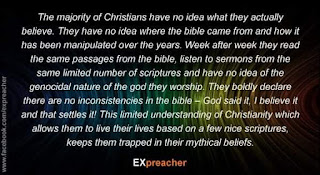First is the point about some scriptures getting enormous airtime while others get none. You may hear, "I know the plans I have for you, declares the Lord. Plans to prosper you and not to harm you, plans to give you hope and a future" a half dozen times or more in sermons throughout the year. However, there is a good chance you have never heard from the pulpit, "Take vengeance on the Midianites… kill all the boys and all the women who have had intercourse with a man. Only the young girls who are virgins may live; you may keep them for yourselves."
As a Christian, I knew way more of the bible than the average parishioner. I had committed whole books to memory. Still, there were swaths of scripture I was completely unaware of. There are over 31,000 verses in the bible but only a few hundred of those ever make it into sermons. When I was deconstructing, this kind of conversation happened regularly-
Me: Did you know the bible says you can have slaves and that you are free to beat them… because they are your property?
My wife: It does NOT say that.
Me: But it does say you should not beat them to death… you can get in trouble for that. However, if they live for a few days after the beating and then die… it’s all good.
My wife: IT DOES NOT SAY THAT.
Me: Yeah, it does. Right here.
My wife: What… the… hell…?!
Bible scholar Bart Ehrman says, “We read our scriptures devotionally, but we view the scriptures of other religions objectively.” Read that slave scripture to your average Evangelical and tell them it is from the Koran and they will see clearly how awful it is. Tell them it is from the Bible and the spin will begin.
I was no different. The few times I heard such biblical critiques as a believer, I quickly shrugged them off. Even if I didn’t have a counterargument, I was confident someone somewhere did.
The second point ExPreacher makes is about the way most believers sign off on the Bible’s inerrancy while having so little knowledge of it. Like the Terms of Service agreement on a piece of software, they click YES without having read the terms.
For evangelicals, belief in the Bible as wholly true and perfect tends to be non-negotiable, even when they don’t understand it. I once talked to a pastor friend about these biblical concerns. He agreed that the Bible is messier than most believers understand, that its construction was complicated and political, and that he believed for all of the divine inspiration that may be there… man's fingerprints are all over it.
“And I can say that here over coffee with you as a friend,” he admitted, “but I can’t say that from the pulpit Sunday morning.”
If you go to his church website, it is written in the belief statements that the Bible is “inspired, infallible, inerrant”.
Simply put, most Evangelical churches exist to direct thinking… not expand it. Christian churches have varied views on things like salvation, atonement, tithing, Hell, church governance, gender issues, etc. There are Christian churches out there that are comfortable saying the Bible is not inerrant. Until I started to look at things with a little more objectivity, I was completely ignorant of how narrow my view of faith was.
As Salt Lake Tribune writer, Robert Kirby, put it -
"For years, I never doubted the truthfulness of what I was taught. This is not surprising considering that virtually anything will make sense if it's all you know."
They say the Truth does not need protection. The Bible has centuries of safeguards put in place to keep most believers from ever viewing it with a critical eye.



